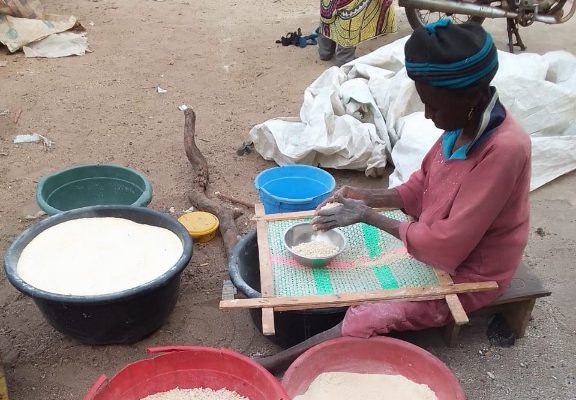

Maryam Soliu, 75, sat down on a wooden chair as she monitored and supervised the running of activities in her local Garri store at Shamsudeen Community, Ilorin East local government area of Kwara State.
Before the crush on the economy, the business of Garri was the only inclined business she could hop into— the huge profit and her achievement in the business has given her no fondness in any other business.

But in recent times, her sales profit has drastically fallen down, significantly amidst the worsening economic landscape.
“I was a petty trader but when surviving to get a prick, I shifted into the garri business and yes, the profit was worthwhile”.

“In 1984 when I started trading in garri production, a truck of cassava (ọkọ Ẹgẹ in Youruba language) was only ₦1000. After the outbreak of COVID-19 in 2020, the price was pegged at N80,000 to N100,000. However, following the removal of fuel subsidy, the price of a truck cassava has now aggressively skyrocketed to about N500,000,” Maryam lamented.

In recent times, the economic situation has descended an unbearable grim on Nigerians, traders wail adversely as their goods give them nothing to write about, the daily soaring on commodities has left most to the penurious state.
In May 2023, following the removal of fuel subsidy by the present administration, daily consumption skyrocketed their normal prices and Nigeria entered the unyielding doom of suffering. Nigeria’s annual inflation rose to 29.90 percent in January 2024 from 28.92 percent in December 2023.
A report by the National Bureau of Statistics (NBS) revealed that the food inflation rate in January 2024 quickened to 35.41 percent on a year-on-year basis, which was 11.10 percent points higher compared to the rate recorded in January 2023 (24.32 per cent).
The cause of this inflation, according to the reports, was triggered by increases in prices of bread and cereals, potatoes, yam and other tubers like cassava; oil and fish, meat, fruit, coffee, tea and cocoa.
The upward trend in the prices of staple food as well as other products has weakened the purchasing power of goods, making it difficult for many households in the country to afford daily meals.
Daily Plight at the Local Store
Sitting beside the circular clay oven demarcated for open fire, there is a need to consistently add the garri, stir across the wide pot until the required level of dryness is reached. One could marvel at Fatimah’s unique way of frying the cassava flour in the large wide pot on the circular clay.
Garri store in Shamsudeen Community
Fatimah could be engrossed in interaction while frying without getting the cassava flour burnt. This she does with dexterity and self indulgence—the way her hand swirls right and left on the big frying pot leaves no doubt of her years of experience in the business.
The 47-year-old woman hails from Kogi state to continue the line of garri production trailing her mother’s footsteps, which she said yield good fruit in her life.
“Garri making is my mother’s earning job, she makes sure none of her children stray from the business of Garri production and we are all equipped with knowledge of its production from A to Z,” she explained.
The Kogi-born woman’s presence in the business for years had accrued her the highest knowledge in its production. However, this does not cease her exposure to other businesses. Aside from being into Garri production, she is a business woman trading in different attires.
She explained that the key to body radiate, and flourishing in the drain task of garri production require a level of strength, agility and proper medication.
Garri production in Nigeria
Garri is a staple food item in Nigeria and many other sub-saharan African countries. It is made from cassava and consumed in different parts of Nigeria, an estimated rate of one million (1,000,000) tons is in demand annually while the national supply estimate is about 250,000.
Nigeria being the world’s largest producer of cassava with a production of 47,406,770 tons in 2013. With such huge production, Nigerians do not lack ideas in utilising the tube for it has many products. Several processing options emerged from cassava, these includes fufu, garri, starch, cassava flour, tapioca, cassava chips, of all the products, garri could be tagged the most common and widely consumed product.

Garri produced in Shamsudeen Community of Ilorin East, kwara State is popular for its ‘whiteness’, dryness and its sour taste. Buyers and sellers patronise the local processors to have their demands both in large and small quantities.
A 2017 paper stated that cassava production on a large scale will have a multiplier effect on Nigeria’s economy on many fronts. That is, Nigeria will not only be guaranteed food security for her teeming population, but will also generate cash income for the largest number of households.
Working profusely, Iya Shukura, one of the women in-charge of sieving the raw Garri grain buttressed the arduous process in its production with grim of fatigueness written over her face.
“Producing garri is not as easy as it seems to be, it involves a tedious process of production. We first start the process by peeling the cassava, after this, we take it to where it will be ground. The next step is to extract water from the grinded cassava, this is done with the use of jack”.
The last step before sieving and package is frying the extracted grains which she described as puzzle and arduous.
Meanwhile, most of the women working in the local store are double-trading, while still earning from their vocational work, they hold firmly onto the production. The business of Garri according to them is their inherent trading they cannot abandon.
Production at the Local Store
People at the local store at Shamsudeen Community began their daily routine at Shao market, a remote and popular village in Moro local government of Kwara state where staples items are majorly in exchange.
Traders in different kinds of goods parade to supply their goods. Motors and tricycles popularly called “Keke” do visit the market to convey people and their loads to town.
Ultimately, the accustomed people trading have their own Keke converter. For the people at the local store, buying a truck of cassava and the arduous process of peeling and jacking of the cassava are done at the Shao market, while the rest of the task would be taken to the local garri processing store for completion.

The hard press process is then followed by other stages like drying and sieving. Then comes the most important task, the process of frying the garri – a task many of the women at the store admitted is gruelling.
Once the Keke arrived at the local store, the place could become buzzed with people’s enthusiasm indulging in their specific task.
Maryam Soliu lamented over the economic hardship troll their business and threw their profit into delusion.
“Garri making is a heavily profitable business. Ever since the removal of fuel subsidy, our profit has waned steadily and little we could take home as profit.”
Crisis of food inflation
The food inflation crisis is a critical aspect of Nigeria’s economic woes. This alarming trend has severe implications for food security, as a growing number of people now struggle to buy even the most basic food items.
However, the recent hike of 100 percent in the cost of staple foods has left millions struggling to eat. Faulting the country’s unfavourable situation and daily inflation on the price of goods, Maryam Soliu bemoaned the effect of the subsidy removal and the soaring stance on the truck of cassava which makes the business less elevated in profit.
“I have been into the business of garri production for forty years. Back then, I gained a lot. Before the subsidy removal in 2022, a truck of cassava was less than three hundred thousand Naira, even with the soar, we still have our profit satisfactory.
“Now, the increase steadily becomes unbearable, a pail of Garri is now sixteen thousand Naira with a blink, little profit to take home,” she added.
Despite the acceptance of their everyday hike and the situation that comes with it, a problem that these women deplore more is the profit degradation they elude from their businesses.
Speaking with an economic expert, Kingsley Ndimele, implored the triggering factors of the daily soaring on commodities to be the effect of subsidy removal and how it deteriorates the economy grimly in the country.
“Just like when the price of fuel increases five times of what it used to be, transportation will also increase at that same rate, so what happens eventually is that producers tend to pass its cost for production to their consumers, this is called cost push inflation and that’s the aftermath effect we are seeing,” Kingsley explained.
He further stated that the cause of the daily rising in the price of goods has a withdrawing effect on trader’s profit and leaves them with no option than to succumb.
“Traders are not entirely making profit this time around, they are only struggling to preserve their working capital because they never can predict what is going to meet in the market.”
Kingsley also identified the freckle in climate change as one of the factors which cause food inflation.
“The imbalance in climate change is one of the factors causing inflation, by now we ought to have been moving to the first plant season of the year but it seems like there’s still a strong heat wave which is also affecting the production on the input of farmers.”









